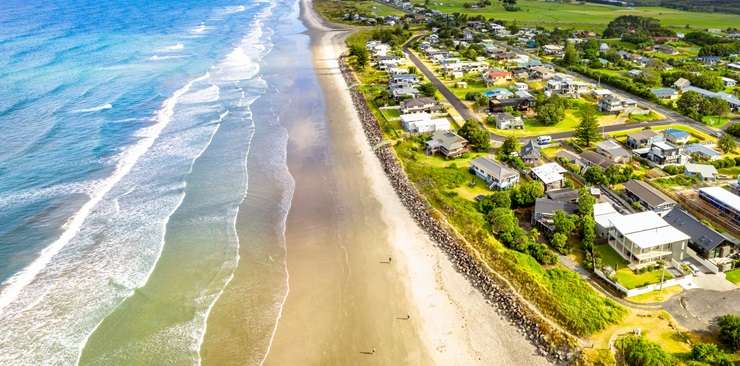Kiwis who rent out their holiday homes on Airbnb and Bookabach say high booking fees and the Government’s new “app tax” are pushing them to the brink.
Agents have told OneRoof some bach owners who rely on bookings from the short-term letting sites are considering selling up or renting their properties out long-term.
They claim that bookings have dried up in the last few months, saying the recent rise in fees are scaring off users.
Since April, online marketplace operators have been required to collect the standard 15% rate on listed services. Airbnb and Bookabach have passed the cost onto users in the form of an occupancy or lodging tax, which along with their own service fee adds about 30% to the advertised nightly rate.
Start your property search
The sites then give the Government 6.5% and pay the remaining 8.5% to the GST unregistered seller to recognise the GST on their costs from supplying listed services.
One user who advertises their holiday home on both Bookabach and Airbnb, told OneRoof she had noticed a significant drop in bookings since the tax change and was starting to wonder whether it was worth it.
Discover more:
- Scramble for houses in elite school zones after spike in rejection letters
- Three renovated houses and a ‘hazardous’ villa snapped up for under $1m
- Auction frenzy turns $20,000 loss into $20,000 profit
A four-night booking for their bach on Airbnb in October is listed on the site as costing $300 a night. However, once the site fees and tax are added, the cost rose to $454.40, pushing the total cost of the stay to just over $1800 – $600 more than users would have first expected.
The owner said they had dropped their nightly rate significantly to try and make it more attractive for people to book, but felt the sites were misleading customers because the total cost was so much higher than the advertised nightly rate.
They believe sites such as Airbnb and Bookabach should absorb the cost of tax by reducing their service fees.
Epsom Tax executive director Gareth Collard said clients who did not manage the property themselves and used a property manager were struggling to break-even after all the costs were deducted.
“The Government gets a bit more GST. It doesn’t affect any of the platforms, but the ultimate person paying is the owners,” he said.
“The only ones who I think would be making money out of their holiday home would be those who have no mortgage on it.
“We’ve had a few clients turn their short-term rentals into long-term rentals because it’s just not worth it anymore to do it through Airbnb.”
Collard said the changes to the tax rules for properties were a complication for bach owners, and might require an accountant to handle – yet another cost.
Harcourts Taupō Rentals & Holiday Homes general manager Lee Grigg said the new GST rule had put the squeeze on owners and guests. Some owners had cut their nightly rate by 15% to try and soften the blow for guests.
“I think it’s still economical if you have lots of people, but if it’s a smaller unit or smaller home and you’ve only two or three people then it may be cheaper now to go to a motel.”

The Government's new "app tax" combined with booking fees have resulted in a drop in bookings, according to several experts. Photo / Getty Images
His firm advertised the holiday homes they managed both on their own Harcourts website and on Airbnb and Bookabach, but those who booked through one of the larger websites paid about 30% more, which was a direct result of the tax and fees charged by the provider.
“We have zero markup on our website whereas Airbnb and every other site – Booking.com and Bookabach – they all have fees which have to be put on top and you’ll find most management companies will have their own booking direct site for that reason.”
Time In A Place director Kristen Clarke, whose company manages short-term lets in Papamoa and Mount Maunganui, said bookings dropped quite significantly after the occupancy tax was first introduced.
Because the company had no control over the tax or service fees charged by the large websites, she said, the only thing they could adjust was the cleaning fee and the nightly rate. “It’s just part and parcel of what they [customers] have to pay – it’s just the new rules.”
InnList director Jason Lock, who manages holiday homes in Rotorua, said holiday homeowners there were feeling the pain more than others.
As well as the GST making it more expensive for people to rent, Rotorua District Council had also started charging commercial rates to properties advertised for at least 60 days a year as short-term accommodation.
Rates had “pretty much doubled” with people having to shell out anywhere from $4000 to $10,000 more, he said.
Lock said they had already lost about 10% of properties because the owners had stopped renting them out short-term because it wasn’t worth it and he expected more to go. Some had been put on the market for sale and others were just being used for the owner’s private use only.
“It’s definitely making it harder – it’s making it harder for everyone really. There’s quite a big admin for us as property managers now – we are essentially paying everyone’s GST so the work there has gone through the roof.”

Bach owners in Rotorua are feeling the pinch from rate hikes. Photo / Getty Images
Lock said bookings had been slower in winter, but due to the poor economic situation at the moment it was difficult to pinpoint exactly why.
“We are just getting hit from every angle. The whole tourism industry in Rotorua has suffered as a result, but certainly holiday houses have.”
Airbnb New Zealand and Australia country manager Susan Wheeldon did not respond to specific questions about whether the tax had impacted bookings and listing numbers, but told OneRoof in a statement that the platform was still popular with travellers and provided guests with an “incredible range of options to suit every preference and budget”.
“With Airbnb contributing billions of dollars to the New Zealand economy and supporting tens of thousands of jobs, the Government should be doing all it can to support the tourism industry rather than making it more expensive for everyday Kiwis and visitors to travel in New Zealand,” Wheeldon said.
OneRoof also asked whether it had considered reducing its host fee or changing the structure of the nightly fee to help make it more viable. In response, Wheeldon said Airbnb had introduced several initiatives aimed at fostering affordability such as new pricing tools for hosts to help them compare their prices to similar listings, making it easy to track local pricing trends.
Expedia Group, which owns Bookabach, had not responded to OneRoof’s questions at the time of publication.
* Disclaimer: The writer rents out their bach on short-term letting sites in New Zealand
















































































